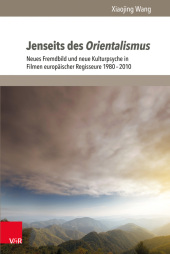 Neuerscheinungen 2014Stand: 2020-02-01 |
Schnellsuche
ISBN/Stichwort/Autor
|
Herderstraße 10
10625 Berlin
Tel.: 030 315 714 16
Fax 030 315 714 14
info@buchspektrum.de |

Xiaojing Wang
Jenseits des Orientalismus
Neues Fremdbild und neue Kulturpsyche in Filmen europäischer Regisseure 1980-2010. Mit einem Vorwort von Prof. Dr. Matthias Freise
2014. 325 S. mit 14 Abbildungen. 23.2 cm
Verlag/Jahr: V&R UNIPRESS 2014
ISBN: 3-8471-0335-0 (3847103350)
Neue ISBN: 978-3-8471-0335-6 (9783847103356)
Preis und Lieferzeit: Bitte klicken
Vorurteile scheinen zu den Dingen auf der Welt zu gehören, die besonders häufig vorkommen und unser Denken und Handeln unterbewusst beeinflussen. Ein gleichberechtigter Dialog zwischen den Kulturen des Westens und des Ostens scheint so kaum realisierbar zu sein. Diese Analyse des China- und Tibetbildes in europäischen Filmen von 1980 bis 2010 zeigt jedoch, dass ein gleichberechtigter Dialog zwischen dem Westen und dem Osten nicht nur möglich ist, sondern sich auch langsam verwirklicht. Die Welt bewegt sich; Europa wandelt sich. Diese Arbeit untersucht, in welche Richtung sich das Fremdbild der Europäer gewandelt hat und welcher Art die neue europäische Haltung gegenüber dem Fernen Osten ist.
Vorurteile scheinen zu den Dingen auf der Welt zu gehören, die besonders häufig vorkommen und unser Denken und Handeln unterbewusst beeinflussen. Ein gleichberechtigter Dialog zwischen den Kulturen des Westens und des Ostens scheint so kaum realisierbar zu sein. Diese Analyse des China- und Tibetbildes in europäischen Filmen von 1980 bis 2010 zeigt jedoch, dass ein gleichberechtigter Dialog zwischen dem Westen und dem Osten nicht nur möglich ist, sondern sich auch langsam verwirklicht. Die Welt bewegt sich; Europa wandelt sich. Diese Arbeit untersucht, in welche Richtung sich das Fremdbild der Europäer gewandelt hat und welcher Art die neue europäische Haltung gegenüber dem Fernen Osten ist.
Zu diesem Titel gibt es digitales Zusatzmaterial:
Misunderstandings appear to be one of those things which happen extremely often. We cannot judge our neighbour from across the street objectively, not to mention a stranger on the other side of the world. An equal dialogue between the cultures of the West and the East therefore hardly seems achievable. Following a thorough analysis of images of China and Tibet in European films from 1980 to 2010, I nevertheless found that an equal dialogue between the West and the East is not only possible but is also slowly being realised. The world does not stay still; Europe is changing. The research thus aimed to clarify in which direction the transformation of the European image of the Other is moving and to determine the new European attitude towards the Far East. As Greenblatt points out, the relationship between a work of art and the dominant ideology of the time in which it is produced is ambiguous. As becomes clear in the case of the European films from the period of 1980 to 2010, an orientalist colouring remains at the manifest level of cinematic texts. However, beyond this a creative rebellion is to be found on the latent level of the films. In other words, the basic function of the image of the Other in these films is not to allow Europe to become distinguished from the Other, but to build up a wide imaginary community of several cultures.
Dr. Xiaojing Wang wurde 2013 an der Universität Göttingen im Fach Komparatistik promoviert.


